i5 / P55 Lab Update - Now with more numbers
by Gary Key on September 15, 2009 12:05 AM EST- Posted in
- Motherboards
Applications-
Cinema 4D R11 x64
Cinema 4D R11 is one of our favorite programs to create high-end 3D images and animations. This particular program is sensitive to memory bandwidth and is well threaded. We track the time it takes to render a swimming pool layout.
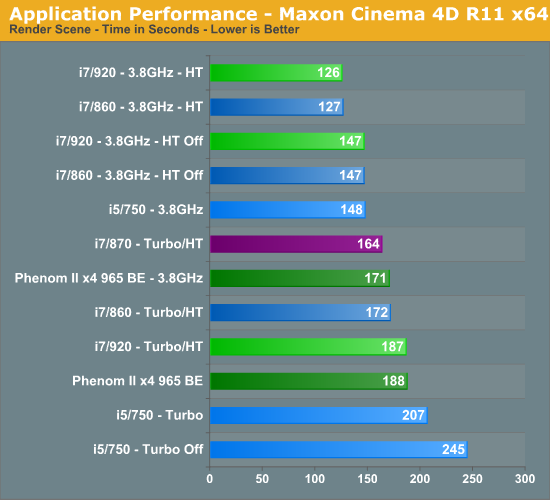
Our i7/920 finishes first with the i7/860 just a second behind at 3.8GHz and with HT enabled. Disabling HT decreases performance 15% when these two CPUs are overclocked. The 965 BE is 27% slower at 3.8GHz than the i7/920 with HT enabled and 14% with HT disabled.
Turbo mode benefits the i5/750 greatly in this benchmark as turning it off results in the 750 being 16% slower. However, pure CPU speed allows the 965 BE to finish the benchmark about 10% quicker than the 750 with Turbo enabled and 23% with Turbo disabled with a 28% higher base clock speed. Of course, the 965 BE is 17% more expensive based on CPU cost comparisons.
LightWave 3D 9.6 x64
Another popular 3D rendering program is Lightwave 3D 9.6. In this test we time the rendering of a single frame from an office building animation. The time to render the full scene is approximately four and a half hours. This title is also well threaded and sensitive to both memory bandwidth and latency.
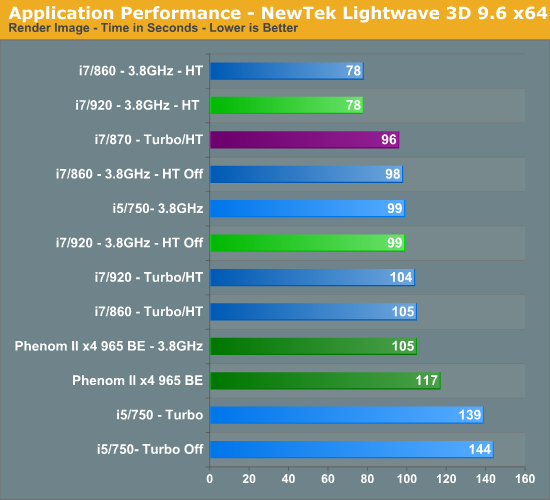
Lightwave also favors HT enabled processors with the 860/920 tying for first at 3.8GHz. Interestingly enough, Turbo mode on the i5/750 only offered a 3% improvement in this bench. The 965 BE scales very well as a 11% core speed increase nets a 10% improvement in the benchmark. However, the 965 BE still trails the 860/920 CPUs by 26% at 3.8GHz.
MainConcept Reference 1.61
One of our favorite video transcoding utilities is MainConcept Reference. We set our profile to iPOD HQ NTSC and then transcode a 651MB 1080P file to an iPOD HQ 34.7MB file.
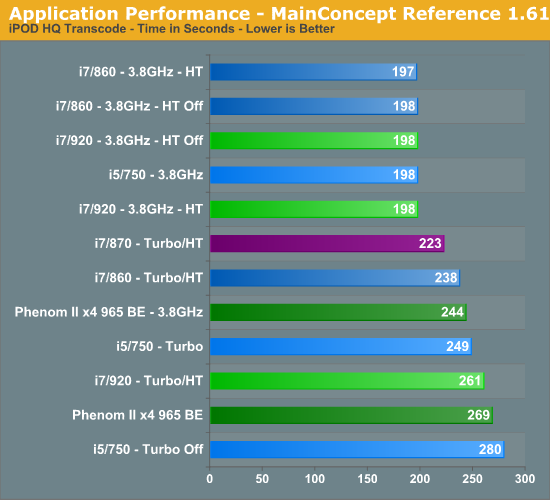
HyperThreading does not make a difference in this title with the 860/920 finishing in a dead heat again. Turbo mode for the i5/750 improves its scores by 11%. Once again, the 965 BE scales very well with an 11% increase in speed resulting in a 9% benchmark improvement. Otherwise, the 965 BE trails the 860/920/750 by 29% at 3.8GHz.
Sonar Producer 8 x64
We utilize Sonar Producer extensively at home when mixing various music tracks. This test performs a complex mix of five individual tracks into a single title. We covert these tracks into a WAV format utilizing a 192kHz sample rate along with all other options enabled. This title thrives on memory bandwidth.
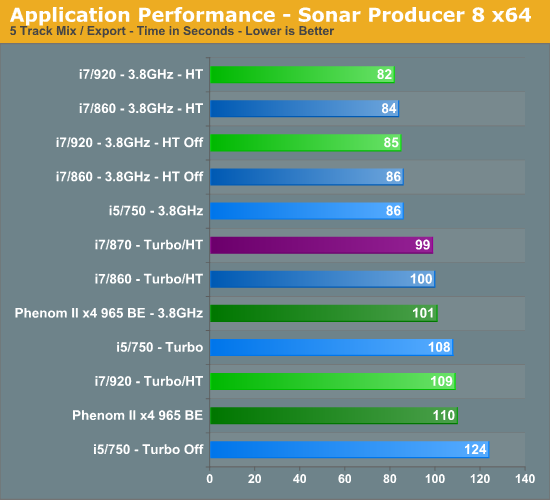
We finally see some separation between the 860 and 920 processors in this benchmark. Based on offline memory testing, we contribute this to the 920’s slightly better throughput under load conditions. The i5/750 performs 13% better with turbo enabled. The 965 BE performs 15% worse than the 750 at 3.8GHz.
Adobe Lightroom 2.4 x64
Lightroom is a quick and easy to use program for batch conversions on digital photos. We perform a standard conversion of 50 RAW images into the JPEG format.
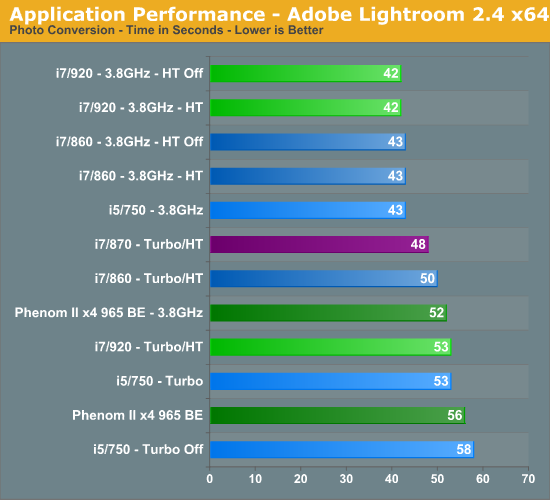
HyperThreading does not matter in this title. The 920 finishes just slightly ahead of the 860. Turbo mode makes 9% difference for the i5/750, just enough to place ahead of the 965 BE at stock speeds. Once overclocked, the 965 BE is 17% slower than the 750.
CyberLink MediaShow Espresso
We transcode a 370MB 1080AVCHD file into a HD friendly file suitable for publishing on YouTube. This program features GPU hardware accelerated decoding via ATI Stream or NVIDIA CUDA but is disabled in our test routines.
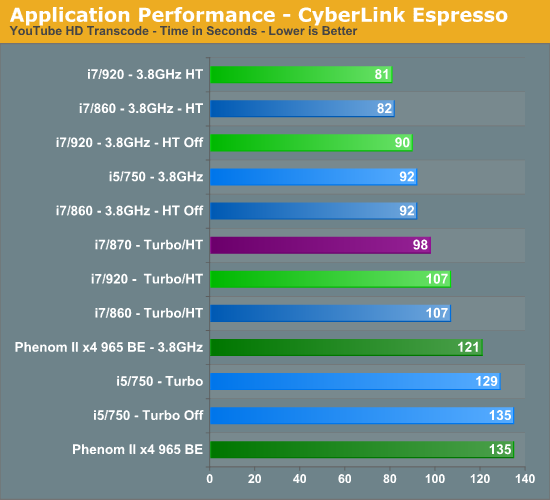
Even with a 740MHz advantage in clock speed, the 965 BE is just equal to the i5/750 with Turbo disabled in this application. Obviously, it appears this particular program behaves differently on Intel processors. Even at a 3.8GHz clock speed, the 965 BE trails the i5/750 by 24%. The 920/860 processors continue to be close, even though in this application the 920 has a slight advantage.










77 Comments
View All Comments
yacoub - Tuesday, September 15, 2009 - link
We really need the P55 motherboard reviews. That's where we (hopefully) learn about temps, stability, power draw, features, etc. I certainly won't be buying until I read reviews for the P55 boards.Stradigos - Tuesday, September 15, 2009 - link
I agree! I can't wait to read it. I won't be buying anything till I do.strikeback03 - Tuesday, September 15, 2009 - link
I'm waiting on the same thing. The ~$50 difference between a P55/860 system and an X58/920 system isn't enough to affect my decision much, but this article mentions in passing that the P55/860 system uses 70W less, which would be a definite consideration for me. I'm waiting to see whether this is only in stock configuration or if there is also a difference when overclocked, temps on good air coolers, etc.jonup - Tuesday, September 15, 2009 - link
I'm with you. I am upgrading within the next 6 months and if the i5/p55 is worth the money I will be jumping on it sooner rather than later. Microcenter has the i5 for $170 after MI sales tax. I would of pull the triger but there is not enough MB reviews yet.Gary Key - Tuesday, September 15, 2009 - link
I am not going to wait much longer, just about every person I have contacts with is working on the NV problem. I just hate showing numbers with the knowledge that something is not right. It is not just games, the 3D Rendering apps like Cinema 4D are affected also. That said, I have spent the better part of the last three days testing with the HD4890. ;)CB434 - Tuesday, September 15, 2009 - link
Gary, this GPU issue...Is it that the i5 and i7 is "underperforming" and is getting less FPS than it is expected to (relative to other benchmarks). Or is it simply that the AMD/275 combo is simply better then expected? Is there a "problem" with the i5/i7 and the 275GTX per se? If there was no AMD/275 test, would you have thought there was a problem?
I'm confused about which is which.
Are your contacts Intel people, trying to find a reason for the "problem" or are they AMD people trying to find an explanation for their "success"?
For the record I've been hunting down 275GTX reviews for quite a while and this is the first I've been able to find using a Phenom II and a 275GTX (no chance of ever finding 275GTX SLI on Phenom :(.. ) It's always an i7 in the GPU test rigs. So finding a frame of reference or baseline for how 275GTX is supposed to work with Phenom CPU's is hard because there is nothing out there.
GeorgeH - Tuesday, September 15, 2009 - link
From other reports I've seen on this issue, it really is a problem and it's specific to 1136/1366 - a high-end 775 C2Q would have performed pretty much identically to the X4 965.Bottom line, LGA775+GT200 looks to be a superior gaming platform to a i7+GT200 right now.
Source (bottom of page):
http://techreport.com/articles.x/17545/6">http://techreport.com/articles.x/17545/6
yacoub - Tuesday, September 15, 2009 - link
So is this issue unique to the P55 boards, or do the X58 (or whatever the i7 920 runs on) exhibit this same issue when running the same NVidia drivers and Win7?If the issue isn't unique to P55, it's not really a factor in which P55 motherboard to buy if they all exhibit the same behavior and the X58 boards do as well.
CB434 - Tuesday, September 15, 2009 - link
That's why turbo mode is so cool.You can get all the upsides of a 24/7 3.8Ghz overclock without the extra heat and power usage. You can OC to 3.2 24/7 and let turbo do the rest. For single and dual core turbo it will shut off the other 2/3 cores, meaning more hz for less power consumed and heat generated. Turbo can give you all the upsides without the downsides, or at least the downsides are reduced.
jeffj29 - Tuesday, September 15, 2009 - link
So it looks like OC'd at 3.8 GHz with HT on that it's a dead heat performance-wise between the x58/920 and then p55/860 platform.The 860 combo would have lower cost but the 920 combo have greater future upgrade performance potential (with a future 6-core processor). But here is the question I am most curious about... how much higher would a 920 (with D0 stepping) overclock to using air cooling than a 860? For example, if the 920 overclocks easily to 4.0 GHz but the 860 wouldn't OC stable past 3.8 GHz then the 960 would be the clear performance pick in my book.